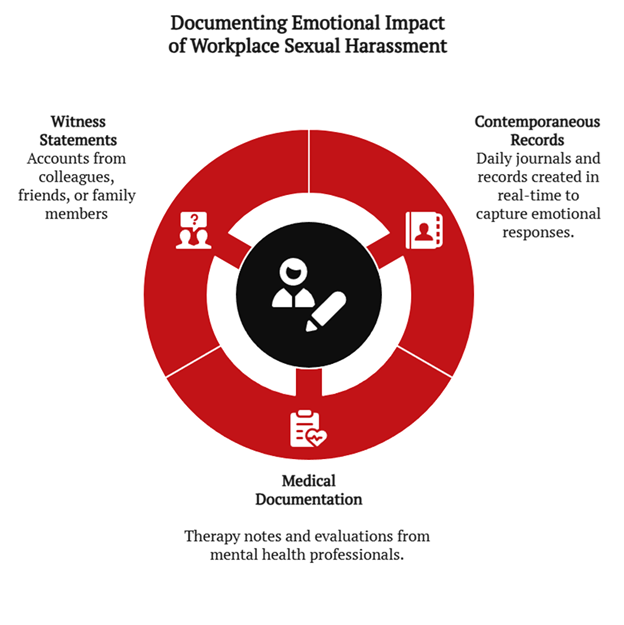Key Takeaways:
- California law recognizes emotional distress as a recoverable item of damages in sexual harassment cases under the Fair Employment and Housing Act (FEHA), even in cases where there is no physical injury.
- Production assistants in the film industry face unique challenges that can impact the emotional harm resulting from harassment, including a high-pressure work environment, long hours, and hierarchical power dynamics.
- Documentation can strengthen a claim for emotional distress damages in sexual harassment litigation, including things like medical documentation from mental health professionals, and witness statements.
- California law permits the trier of fact to value emotional distress by considering several factors, including the severity and persistence of symptoms, relationship between harassment and harm, and professional documentation.
- Time limitations apply – individuals generally have three years to file an administrative complaint with the Civil Rights Department under the FEHA, and another year after obtaining the right to sue letter to file a suit.
Understanding how the law approaches emotional distress damages can help production assistants better assess their claims and secure proper documentation within California’s legal framework.
Production assistants working in Hollywood face unique challenges when experiencing sexual harassment. While economic damages like lost wages are often discussed, emotional distress damages represent a significant but sometimes overlooked aspect of sexual harassment cases under California law. Understanding the legal framework surrounding emotional distress damages can help individuals make informed decisions when faced with difficult situations.
Recognizing Compensable Emotional Distress in California
California law permits the recovery of money damages for emotional suffering and harm in sexual harassment cases. Under the California Fair Employment and Housing Act (FEHA), production assistants experiencing sexual harassment may seek compensation for emotional distress even without physical injury. Attorneys specializing in employment law can provide guidance on how these provisions might apply to specific situations.
Emotional distress resulting from workplace sexual harassment can be different in film production environments as compared to a conventional workplace. The high-pressure, hierarchical structure of film sets can play a role. Long hours (sometimes 12-16 hour days), inconsistent schedules, intense deadline pressure, and the competitive nature of the industry may compound psychological impacts. Many production assistants also face the challenge of maintaining professional composure while experiencing emotional distress resulting from workplace sexual harassment, which can further exacerbate emotional suffering.
California law recognizes and allows for the consideration of unique case specific factors when valuing emotional distress claims. Compensable emotional distress most commonly includes or involves anxiety, depression, sleep disturbances, concentration problems, and changes in social behavior. The trier off may distinguish between normal workplace stress and stress resulting from sexual harassment by examining and considering:
- The nature and severity of harassing conduct
- The frequency and duration of harassment incidents
- Power dynamics between involved parties
- Impact on daily functioning and work performance
Documenting Emotional Impact
Documentation strengthens emotional distress claims in California workplace sexual harassment cases. Consulting with an attorney early in the process can provide guidance on effective documentation methods that may strengthen a potential claim. Evidence may include several types of documentation:

Contemporaneously created documents and records tracking emotional responses help establish the connection between harassment and psychological harm. Daily journals documenting one’s emotional state and suffering can be helpful. These records may be more effective when created contemporaneously rather than retrospectively.
Medical documentation from mental health professionals can carry significant weight with a jury. Therapy notes, psychiatric evaluations, and prescribed treatments help validate the severity of emotional suffering. Mental health professionals can also provide important support for healing, regardless of whether legal action is pursued.
Witness statements from colleagues, friends, or family members who observed behavioral changes add another layer of verification. These accounts help demonstrate the real-world impact of harassment-induced distress. Individuals with concerns about their situation may benefit from discussing options with qualified legal counsel before gathering such statements.
[ILLUSTRATIVE EXAMPLE]
In a hypothetical situation, a production assistant experiencing anxiety attacks and insomnia after repeated sexual harassment might document these symptoms through therapy sessions, personal journals describing emotional states after incidents, and statements from roommates who observed the changes in sleep patterns and mood. This documentation helps establish the connection between harassment and emotional suffering.
[END EXAMPLE]
Reporting Considerations and Support Resources
Reporting sexual harassment represents an important consideration, independent of whether legal action is contemplated. California law provides certain protections for individuals who report harassment, though these protections have limitations. Many entertainment companies have established reporting procedures, though their effectiveness varies.
Support resources exist for production assistants experiencing harassment, including industry-specific organizations focused on workplace safety and mental health. These resources may provide valuable guidance and emotional support during difficult situations. Seeking support early often helps mitigate emotional impacts and provides documentation that might prove relevant if legal options are later considered.
Quantifying Emotional Damage Under California Law
California law allows triers of fact to evaluate emotional distress using several factors, including:
The severity and persistence of emotional symptoms influence compensation assessments. Long-term psychological impacts typically warrant higher compensation than temporary distress.
The relationship between harassing conduct and resulting emotional harm plays a crucial role. The trier of fact can examine whether the distress proportionally relates to harassment severity.
Professional documentation of emotional impact can significantly affect damage calculations. California courts often give substantial weight to expert testimony from mental health professionals who can articulate the connection between harassment and psychological harm. Consulting with an attorney who has experience with harassment cases can provide insight into documentation approaches that courts have found compelling in similar situations.
Industry-specific considerations factor into emotional distress evaluations in entertainment workplace cases. Courts recognize that production assistants face unique vulnerabilities due to:
- Highly competitive career paths increasing the impact of power imbalances
- Close-knit industry networks magnifying concerns about professional consequences
Pre-existing mental health conditions don’t disqualify emotional distress claims. California law permits recovery when harassment exacerbates existing conditions, though this may affect the compensation amount. Legal counsel familiar with California employment law can explain how courts typically view cases involving pre-existing conditions.
Important Timelines Under California Law
California law establishes specific deadlines for filing sexual harassment claims arising under the California Fair Employment and Housing Act (FEHA). Understanding these timelines is essential, as they vary depending on the legal avenue pursued:
For claims under the FEHA, individuals generally have three years from the most recent date of harassment to file an administrative complaint with the Civil Rights Department (CRD, formerly DFEH) and obtain a right to sue. After receiving a right-to-sue notice from the CRD, individuals typically have one year to file a lawsuit.
These deadlines may be affected by various factors, including continuing violations or discovery of harm. Given the complexity of these timelines, consulting with an attorney familiar with California employment law early in the process can help ensure important deadlines aren’t missed.
Conclusion
Emotional distress damages are an important part of sexual harassment cases for production assistants in California. Understanding how the law treats emotional suffering resulting from workplace sexual harassment helps individuals recognize valid claims and appreciate the importance of proper documentation.
Frequently Asked Questions
Q: Do individuals need to see a therapist to prove emotional distress in a California sexual harassment case?
A: No. While testimony of a treating health care provider can be helpful is not always necessary. In fact there are some situations where it can hurt the case (like for example in cases where the plaintiff suffers only a mild degree of emotional distress). Consulting with an attorney can help determine what documentation might be most relevant to a particular situation.
Q: When might someone consult with an attorney about emotional distress from sexual harassment in the film industry?
A: Many individuals seek legal guidance when emotional symptoms persist after they report sexual harassment to no avail. Consulting with an attorney familiar with California employment law early in the process can help victims better preserve evidence and better understand the available options. Even those unsure about pursuing legal action may benefit from a confidential consultation to understand potential rights and considerations.
Frequently Unasked Questions
Q: How might social media activity affect an emotional distress claim in a sexual harassment case?
A: Social media posts potentially impact emotional distress claims if they contradict reported symptoms. The trier of fact may examine online activity showing social engagement or positive emotions during periods when severe distress was claimed. Attorneys familiar with employment law cases often advise caution regarding social media usage during pending legal matters.
Q: What if someone experienced emotional distress but continued to perform well at their production assistant job?
A: California law recognizes that individuals may experience significant emotional suffering while maintaining work performance. High functioning despite distress doesn’t invalidate claims, though it may influence how juries assess damage amounts. This concept reflects the understanding that many individuals, particularly in competitive industries, may push through significant distress due to economic necessity or professional dedication.
Disclaimer:
This content is for informational purposes only. This content is not legal advice. No attorney-client relationship is formed through this content. Please consult a qualified attorney in your jurisdiction for legal advice specific to your situation.
Protect Your Rights | The Akopyan Law Firm, A.P.C. | Top Gun Employment Lawyers
Have you been wrongfully terminated from your job? Have you suffered discrimination, harassment, or retaliation in the workplace? Has your employer violated wage and hour laws? If so, we can help. The Akopyan Law Firm, A.P.C. is dedicated to protecting and enforcing employees’ rights throughout Southern California. With a 97% success rate and millions recovered for our clients, our team of experienced and talented employment lawyers can fight to secure the justice you deserve.
Take the First Step Towards Securing Justice: Call us today to speak with one of our experienced employment lawyers. The firm offers case evaluations free of charge.
Contact Us Today:
- Phone: (818) 509-9975
- Office Locations: Los Angeles, Bakersfield, Costa Mesa, Temecula, Rancho Cucamonga, Oxnard, Culver City, and San Diego in California.
Important: Contacting the Akopyan Law Firm, A.P.C. does not create an attorney-client relationship, but all communications will remain private and confidential. Each case is unique. The Akopyan Law Firm, A.P.C., does not guarantee any outcome.

